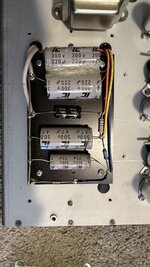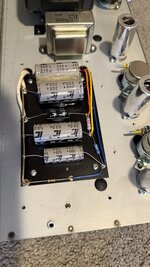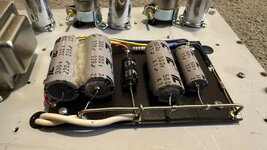hellzington
Well-known member
Hey y'all, need a quick opinion from someone with more technical knowledge than myself. I'm currently selling a Fender Custom Shop Tone Master amp and a prospective buyer has been driving me a bit nuts with excruciating minutiae.
Annnnyhow, after pulling the chassis several times for various pics, he asked to see the filter caps under the cap can. I sent him the pictures attached to this message. Here is his response:
"Thanks for the pics Mike. You can see in pic #2 that the second and third caps’ ends are bulging and on the third one it is leaking electrolytic material and causing the small crystalline flecks you see."
I took a look at the pics again and couldn't really see what he was talking about. So I pulled the chassis again and shot this video:
He responded: "Hey Mike, thanks for taking the time to post the video. I think I understand what our misunderstanding about the condition of the caps is. I’m not talking about the exterior of the body of the caps and your video shows that the exterior of the cylinder of them is not bulging. I’m talking about the 'ends' of the capacitors. From the pics that I mentioned, one endcap is bulging a bit and the other is bulging and there looks to be a similar situation on the other and there appears to be small 'pimples' on the other."
I was showing the ends in my video, specifically how they are NOT bulging. I tried to show a 90 degree dead-on side view where the caps are totally flat. FWIW - I don't see any views on the video so no idea if he even watched it.
I know these are the original caps on a 20+ year old amp and they will obviously have to be replaced in the not-too-distant future, but am I crazy for thinking these are generally fine? He is saying that the amp will imminently fail and blow the output transformer.
Assistance please?
Annnnyhow, after pulling the chassis several times for various pics, he asked to see the filter caps under the cap can. I sent him the pictures attached to this message. Here is his response:
"Thanks for the pics Mike. You can see in pic #2 that the second and third caps’ ends are bulging and on the third one it is leaking electrolytic material and causing the small crystalline flecks you see."
I took a look at the pics again and couldn't really see what he was talking about. So I pulled the chassis again and shot this video:
He responded: "Hey Mike, thanks for taking the time to post the video. I think I understand what our misunderstanding about the condition of the caps is. I’m not talking about the exterior of the body of the caps and your video shows that the exterior of the cylinder of them is not bulging. I’m talking about the 'ends' of the capacitors. From the pics that I mentioned, one endcap is bulging a bit and the other is bulging and there looks to be a similar situation on the other and there appears to be small 'pimples' on the other."
I was showing the ends in my video, specifically how they are NOT bulging. I tried to show a 90 degree dead-on side view where the caps are totally flat. FWIW - I don't see any views on the video so no idea if he even watched it.
I know these are the original caps on a 20+ year old amp and they will obviously have to be replaced in the not-too-distant future, but am I crazy for thinking these are generally fine? He is saying that the amp will imminently fail and blow the output transformer.
Assistance please?



